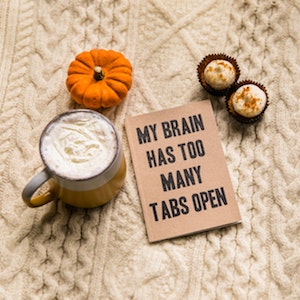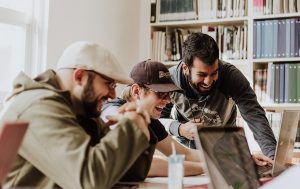Lifelong learning and its benefits for mental wellness and brain health have been research since the 70’s when the first Universities of Third Age appeared. Since then, further research continues to showcase how valuable lifelong learning can be, specially to deal with the stresses of today’s world.
When we learn new things we create new neural pathways in our brain, increasing or preserving our cognitive function among other things. Lifelong learning is like going to the gym but for your mind, your brain doing push-ups!
Here are 10 amazing benefits of lifelong learning and community learning:
1. Improves/ maintains cognitive function
Did you know our brains start declining at 30?
However, research shows that learning new things will improve or preserve your capacity for remembering, reasoning, problem-solving and decision making.
Learning is like a workout for your brain. It develops new neural pathways and strengthen existing ones which keeps your brain young!
2. Increases resilience

Did you know learning new things can make you more resilient? And don’t we all need a bit more resilience right now.
Learning can build up our cognitive reserve and resilience, which is the brain’s adaptive response to stressful and traumatic events and illness, including brain injury, mental illness and normal ageing.
The more we learn, the more we workout our brains which builds our capacity to deal better with what life throws at us.
3. Staves off dementia and brain degenerative illnesses
Sadly, dementia is the 2nd largest cause of death in Australia.
But good news is, there is something we can do about it!
Multiple studies have shown that lifelong learning decreases our chances of having dementia and other neurodegenerative conditions.
A recent study showed that people who engage in mentally challenging activities were 2.5 times less likely to have Alzheimer’s!
4. Reduces stress and anxiety
 When was the last time you learnt something for fun? Just because you wanted and not because you felt you had to up-skill or retrain for work?
When was the last time you learnt something for fun? Just because you wanted and not because you felt you had to up-skill or retrain for work?
Learning is a great way to increase the pleasure within your life and can have a direct impact on our stress levels by releasing the calming effects of dopamine.
Research has proven that having a go at crafts like knitting, crochet, macrame and sewing can all lower your stress levels!
5. Boosts self-esteem and life satisfaction
Several studies show that those who frequently engage in learning new things, building up hobbies or engage in arts and crafts activities, have higher self-confidence and self-esteem.
A particular study (Hammond 2004) explored how lifelong learning boosted self-insight and helped people feel more empowered in their day to day life.
6. Reduces loneliness and social isolation
 Loneliness occurs when a person feels disconnected and isolated, even when others are present.
Loneliness occurs when a person feels disconnected and isolated, even when others are present.
A 2015 study in Australia showed loneliness can lead to depression, cardiovascular disease and cognitive decline.
There are lots of strategies to reduce loneliness. Research shows cognitive therapy and engagement in meaningful, satisfying group activities are some of the most efficient.
7. Increases emotional resilience
How do you deal with stressful or unexpected events?
Emotional resilience is the ability to calm our panicked mind after a negative experience. It’s how we bounce back and deal with setbacks in life.
A simple way of developing emotional resilience is spending time doing things we love, exploring our passions and cultivating hobbies
8. Can help us deal with burn-out
Burnout is when the unrelenting stress and demands of life depletes our executive function and leaves our mind feeling unstable and exhausted. Sound familiar?
One of the best things we can do to beat burnout is to regain time for ourselves.
This time for ourselves has to be invested in activities that give us joy. Crafts, music, gardening and arts are some really ways to engage in meaningful activities!
9. Connects us with our community
Learning together in informal settings leads to increased community connection.
When we learn, we tend to engage with others, share our knowledge, ask questions and help others.
This can enhance our relation to our local communities and neighbours.
10. Opens our minds to new ideas
The world keeps changing fast; however, the older we get, the more we become more set in our ways.
This can make it harder to comprehend new concepts and be flexible – as our brain’s cognitive function starts to decline.
Learning new things helps our minds stay flexible and open.
This can then increase tolerance and foster community appreciation.

Further Research
Here are some studies about it if you would like to read more:
Guglielman, Eleonora. (2012). The Ageing Brain: Neuroplasticity and Lifelong Learning.
Lifelong learning and the aging brain- Z Robertson – Senior law handbook. Colorado – 2014 – dev.cobar.org
Neuroscience: implications for education and lifelong learning Uta Frith Integrating Science and Practice VOL.3 NO.1 MAY2013
Lifelong Learning in Later Life, Brian Findsen, Marvin Formosa 2011 (Available on books.google.com)
Education and Health: Evaluating Theories and Evidence David M. Cutler and Adriana Lleras-Muney NBER 2006 JEL No. I1, I2
The learning way: Learning from experience as the path to lifelong learning and development. AM Passarelli, DA Kolb Chapter 6 from Oxford handbook of lifelong learning, 2011 (Available on books.google.com)
Lifelong learning; why do we need it?, Marjan Laal, Peyman Salamati, Procedia – Social and Behavioral Sciences, Vol 31, 2012,
Norman Doidge, “The Brain that Changes Itself” 2010
Norman Doidge, “The Brain’s Way of Healing: Remarkable Discoveries and Recoveries from the Frontiers of Neuroplasticity” 2015
Simone, P.M., & Scuilli, M. (2006). Cognitive benefits of participation in lifelong learning institutes. LLI Review, 1, 44-51.
And if you love neuroscience and storytelling, any of Dr Oliver Sack’s books are a delight! (Not much to do with the topic of ageing/learning but more about the brain and it’s amazingness).
Photos can be found on Unsplash.com and are borrowed with thanks from: Ian Schneider, Priscilla du Preez, That’s Her Business, Antenna CW and Facurian Design.
